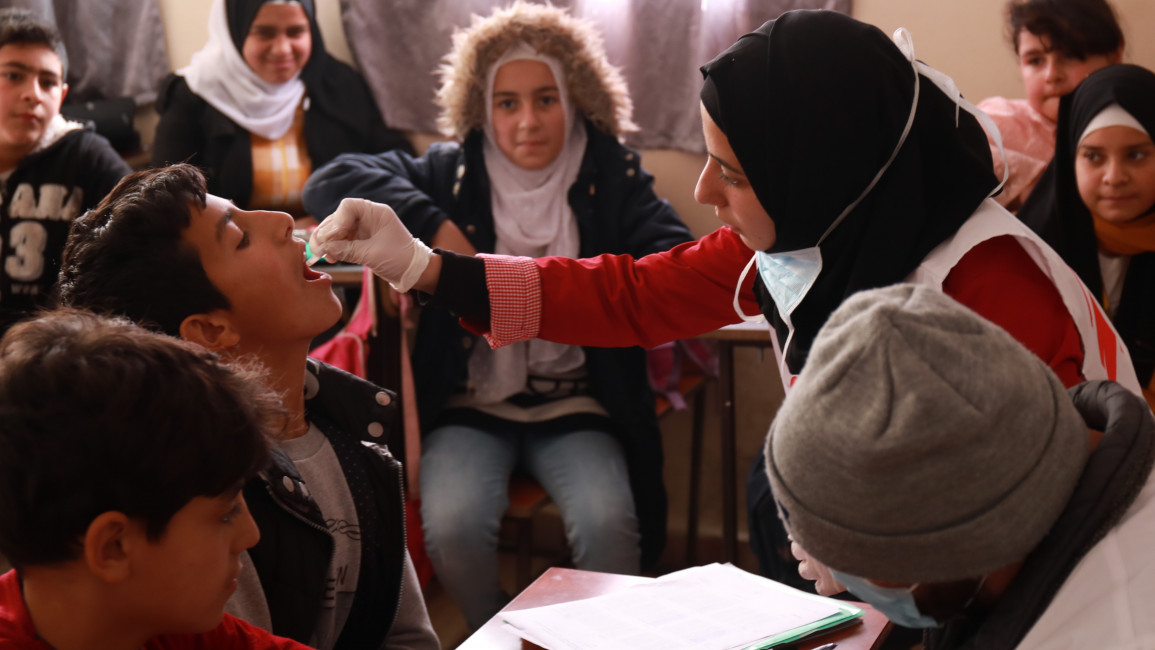Vaccine acceptance high with 440,000 vaccines administered as cholera spreads through Lebanon
Healthcare workers report high vaccine acceptance among affected communities as Lebanon's cholera outbreak continues to sweep through the country.
The vaccine campaign, launched by the Lebanese Ministry of Health (MoH) and international partners, started on 13 November. It dispatched healthcare workers door-to-door to vaccinate 70 per cent of residents in the three areas most vulnerable to the disease – Akkar, Bekaa and Central Bekaa.
"Some people didn't want the vaccine at first, they were hesitant like they were with the COVID vaccine, but after we explained there was no needle or side effects, they accepted it," Khaled Osman, a Doctors Without Borders (MSF) worker who registers patients for their vaccines, told The New Arab.
More than 440,000 cholera vaccines have been administered across the country, according to the MoH on 30 November. The one-dose oral vaccine provides up to six months of protection against the waterborne disease.
As the vaccine rolls out, cholera cases continue to increase, with almost 4,600 cases to date – though health officials warn that the caseload is under-reported.
Cholera, spread by water contaminated by human faeces, causes severe dehydration and in severe cases, can lead to death if not treated.
Health workers have set up emergency hospitals in the country's north and Bekaa valley, where poor infrastructure has allowed the disease to spread.
One such hospital, set up by UNICEF and staffed by MSF in the town of Arsal in the Bekaa valley, started welcoming patients on 20 November. The town has tens of thousands of Syrian refugees living in informal settlements alongside Lebanese residents.
Aisha (a pseudonym), whose son was in the hospital as a suspected cholera case, told TNA that she brought her son to the clinic after he started vomiting and having diarrhoea.
[William Christou/TNA]
"He started to throw up and have diarrhoea, and when a team came to vaccinate us, they sent me here. Thank god, the vomiting has stopped, but his body is still weak," Aisha said.
The hospital has twenty beds and enough supplies to treat up to 3,500 patients.
"We have a team raising awareness in the camps … in case anyone has any cholera-like symptoms, so they can send them here. People have been coming to the clinic quickly when they get symptoms," Zeina al-Mowadi, a nurse in the MSF clinic, told TNA.
"We learned a lot about cholera in university, but we never expected it could happen here. But now with this crisis, it became possible," al-Mowadi said.
Door-to-door
Teams of MSF staff walked through Arsal's winding camps, knocking on tin doors and asking if they could administer vaccines to families. Before giving the vaccine, they registered the family members' personal info and marked an X on the hands of children with a marker to avoid double dosing.
Staff also provided information as they went, both about the disease and the vaccine. A mother asked if the vaccine had any side effects before letting her children take it.
Another resident alerted staff that there were at least three cases of extreme diarrhoea in the camp, telling them where they were located.
[William Christou/TNA].
At a primary school just a few meters away, MSF staff went classroom to classroom, giving children a speech about the importance of cleanliness and how to prevent cholera, before administering the vaccine.
Children were eager to receive the vaccine but pulled faces at its apparent salty, bitter taste.
"The teachers have been teaching students the benefits of the cholera vaccine. We spoke with the families, who were cooperative and accepted the vaccine. They were very aware of the disease," Suleiman al-Zaghwit, a teacher at a local primary school, told TNA.
Poor water infrastructure
Vaccination will help contain the spread of cholera, but poor water infrastructure and unsanitary conditions mean that future outbreaks of water-borne diseases will remain a possibility.
Both sewage disposal and drinking water are a concern in Arsal.
One resident in an informal settlement in Arsal said that access to clean water was a daily struggle.
"We fill up water once a week, but it is never enough for us. If there are cholera cases, we can't take precautionary measures because of the lack of water and cleaning products. We haven't been able to afford cleaning products in three years," Yasmin, a Syrian refugee and mother of four, told TNA under a pseudonym.
Without access to a proper sewage network, residents bury sewage in pits. In the rainy season, these pits often overflow, coating the streets in streams of sewage.
Residents rely on private water trucks and privately-drilled wells for drinking water. Oftentimes these wells are situated close to the same pits used for sewage disposal.
"I am pretty sure we would find faecal matter in the water tanks, because of the wastewater situation. But this would need more analysis," Johan Duhamel, an MSF water and sanitation officer, said to TNA.
In an effort to decontaminate drinking water sources, UNICEF is chlorinating household tanks and providing access to clean water in at-risk areas.
"Water chlorination for refugee camps is done on two levels: Water trucking level and household tanks' level…. UNICEF is also providing chlorine to the Bekaa Water Establishment … as well as for a number of boreholes under municipalities' oversight," a spokesperson for UNICEF said to TNA.
UNICEF had previously reduced the amount of water allocated to residents of informal settlements from 35 to between 20 and 7.5 litres per person per day. It quickly reversed this decision after the cholera outbreak in early October.
However, the organisation warned that it only had the funds to continue supplying this quantity of water until mid-February 2023 and appealed to the international community for funds.

![A pro-Palestinian encampment at Columbia persists, despite recent arrests. [Brooke Anderson/The New Arab]](/sites/default/files/styles/image_330x185/public/2024-04/417084c8-3251-4705-8422-058fca1d5709.jpg?h=ddb1ad0c&itok=T2cXVfXy)

